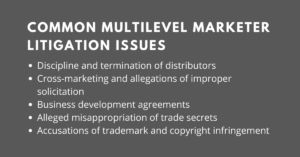When it comes to network marketing companies, commonly referred to as multi-level marketing (MLM) companies, the network of relationships that MLMs develop are a common cause of litigation and arbitration. Litigation is always expensive and the outcomes uncertain so avoiding it is a best practice.
Network marketing is legal when executed properly and aligned to regulations. MLMs typically start out small - selling to family and friends - and when successful, grow quickly, often without time to update their policies to match their vast national or international network of salespeople. The sales network may be selling a product off-label or with unlawful promises as they work to not only sell but recruit an even larger network of salespeople. The unwitting distributor could be violating company policies or the law and then face far reaching retribution, including withholding of payments earned or the termination of the business altogether.
When MLM companies fail to deal conscionably with the large array of legal issues and personalities as they grow, especially when its distributors circle the globe, the ramifications are commonly heaped onto the shoulders of the distributors. MLMs try to modify their contracts to point the finger at the distributors and away from themselves to avoid legal penalties or loss of shareholders. Unwary distributors caught in the crosshairs need to appreciate they are often at odds with the goals of the MLM company.
Position of Power
When they initially sign on work with an MLM, distributors may not recognize the full extent of the terms that the MLM will attempt to hold them to. While a potential distributor might be presented with a brief, one page document to sign, those short forms often cross-reference and purport to integrate huge, outside documents outlining terms that heavily favor the MLM.
These additional documents could include disciplinary procedures allowing the MLM to terminate a distributor with little or no due process or compensation. They can also include terms that are so vague that they leave the MLM near-absolute discretion to interpret its side of the deal as it sees fit.
Another MLM tactic is to issue rapid fire policy changes in contracts with distributors that can leave distributors unsure of what rules or expectations they will be held to. As an MLM increasingly drafts policy that favors the company, distributors are squeezed into unfavorable positions that can lead to litigation.
Lopsided Contracts
In theory, many distributors are independent business owners who are free to walk away from the MLM at any point if the MLM's terms become too onerous or if a distributor is treated unfairly. In practice, however, successful distributors have often invested such significant time, money, and effort in building those businesses that they consider it untenable to walk away from that business. It is the distributor's relationships that enabled the MLM to generate its substantial wealth and those relationships are often locked away from a distributor who leaves the MLM for a different venture.
Ultimately, a distributor may find himself at the mercy of an MLM that claims the power to either impose onerous, unworkable conditions or terminate the distributor's business. A distributor in those situations may have little choice but to either give in and walk away or hire experienced legal counsel to fight for his rights.

Legal Recourse
Where does this leave distributors following their American dream, small-time entrepreneurs as well as larger-scale success stories? Distributors are building a business, putting their heart and soul into creating that business.
The initial policies a distributor signed decades ago may be unrecognizable from the MLM policies a distributor currently operates under. Distributors need to know what they originally signed and whether they were forced to adopt the changes that led to the current iteration.
Those who are uncertain about the language and terms should work with a qualified attorney to make sure key provisions in their contract are fair and conscionable. "Unconscionable" policies and provisions can be legal and enforceable under specific circumstances or illegal and unenforceable under others. Where the line is drawn is the foundation work for a qualified attorney to ensure a distributor is being treated fairly.
There are some key modifications to watch out for in MLM policies, including:
- Contracts that lock in a high damage limitation and specify that a distributor cannot get future income from the MLM
- Mandatory arbitration clauses that favor the MLM to the disadvantage of the distributor
- Clauses giving an MLM the discretion to terminate a distributor's account for no reason or in its sole discretion
- Unfair compensation changes or structures that leave a working distributor without the benefit of the bargain he or she signed up for initially
- Over ambitious non-compete provisions preventing the distributor from leaving the MLM for a better opportunity
Unconscionable provisions may be thrown out in court (i.e., dismissing the MLM policy in favor of distributors' rights to basic fairness) but a distributor might need to be prepared for a protracted fight against the well-funded MLM's pocket. Merely hiring a lawyer or sending a demand letter is unlikely meet a distributor's needs or force the MLM to the table.
Many MLMs have their own attorneys standing ready to call a distributor's bluff, push a dispute into arbitration, and fight a case up to trial. Ultimately, defending a distributor's rights requires litigators who know the MLM landscape and have the willingness and ability to take a case all the way.
The content of this article is intended to provide a general guide to the subject matter. Specialist advice should be sought about your specific circumstances.


